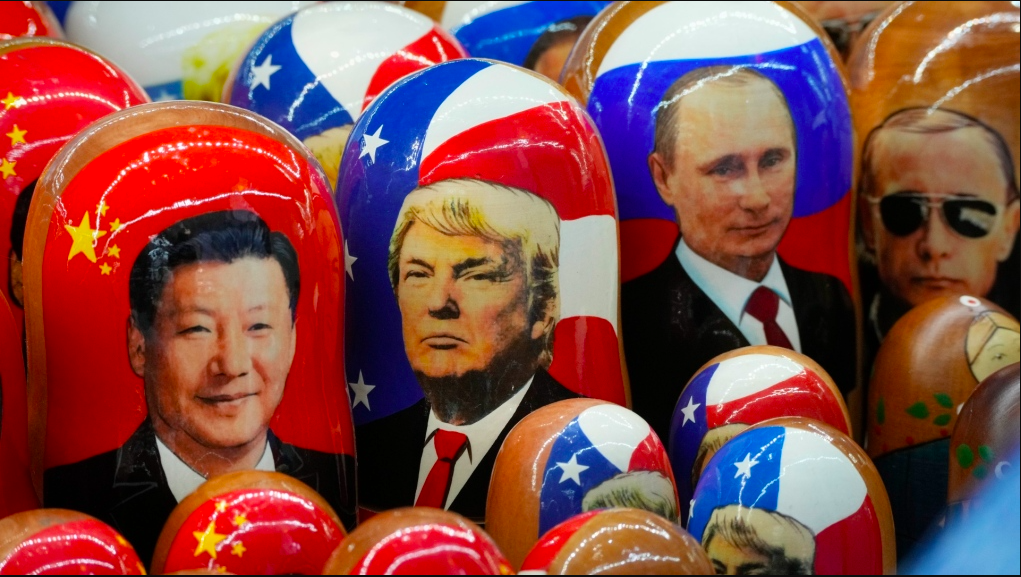
Published 12/02/2024 19:15 | Edited 12/02/2024 19:16
The president-elect of the United States, Donald Trump, generated diplomatic tensions by threatening to apply 100% tariffs on products exported by BRICS countries if the bloc moves forward in replacing the dollar in international transactions. The statement comes amid growing discussion about de-dollarization in the group, which now brings together Brazil, Russia, India, China, South Africa and six other recently admitted members, including Saudi Arabia and Iran.
The size of the Brics in the world economy represents 46% of the world’s population. The combined GDP of the group’s members exceeds that of Western powers, according to projections by the International Monetary Fund. The bloc’s economies include China (2nd largest in the world), India (7th), Brazil (9th) and Russia (11th).
Their economies are still emerging, there is still a lot of poverty within their countries and their military powers still do not surpass that of the most developed countries. There is also the fact that the Brics are not a cohesive group, neither politically nor culturally.
BRICS and dedollarization
Since the creation of the post-World War II global financial system, the dollar has established itself as the main reserve and international trade currency. This position, however, has created vulnerabilities for emerging economies, especially in the face of fluctuations in US monetary policy and unilateral economic sanctions, such as those applied against Russia after the invasion of Ukraine.
BRICS leaders, especially Brazilian President Luiz Inácio Lula da Silva, have advocated the use of local currencies in commercial transactions as a way of reducing dependence on the dollar. The bloc must move forward in building a financial system that is less dependent on the dollar, strengthening the New Development Bank and economic cooperation between its members,” said Lula during the Brics summit last month, held in Kazan, Russia.
Last year, the Central Bank of Brazil signed a memorandum of understanding with the Central Bank of China to facilitate direct commercial transactions between the real and the yuan, without the need for conversion to the US dollar.
China and Russia are leading initiatives in this regard, with the former expanding (and strengthening) the use of the yuan in bilateral transactions and the latter pushing for alternatives after being excluded from the global SWIFT payments system. When Argentina faced a worsening of its financial crisis that has been going on for years, China financed the South American country in yuan.
Trump’s response and economic implications
On a social network, Trump called the idea of replacing the dollar “absurd” and stated: “They can look for another ‘sucker’”. He threatened to raise import tariffs on products from BRICS countries, saying this would be a response to the attempt to “subvert American hegemony”.
Trump’s threats of tariffs hark back to the protectionism that marked his first term, when he increased tariffs on imports from countries like China, instead of offering incentives and fewer sanctions. Economists warn, however, that such measures could have a reverse effect, further encouraging emerging countries to move away from the dollar.
Trump’s tax rate is applied to exported goods. However, Iran, Russia and the United Arab Emirates send less than 3% of their exports to the US, an insignificant dependence given the threat. From Saudi Arabia, Egypt and Argentina, the average is 5% to 10%. In the case of Brazil, China, India and Ethiopia, it accounts for between 10% and 21% of their total exports.
The climate in international trade reflects the implosion of the WTO (World Trade Organization) and its common rules, as the US loses interest in managing multilateral organizations.
International impacts and reactions
Kremlin spokesman Dmitry Peskov said the US is making a “strategic mistake” by using the dollar as a political weapon. He highlighted that the global trend of monetary diversification is already underway, and that Trump’s threats only accelerate this process. “A shot backfired”, he compared.
On the other hand, experts point out that, although the BRICS discourse on dedollarization is robust, practical implementation faces challenges. Countries like Brazil, although they carry out transactions in local currencies with China, still maintain a large part of their international reserves in dollars.
China has already responded to American taxes and sanctions with a “supply chain war”. Important companies, such as suppliers to the US Military, have lost access to supplies of Chinese lithium batteries, for example. The aim has been to use China’s status as the world’s factory to mete out punishments.
European Central Bank (ECB) President Christine Lagarde called on European Union (EU) leaders to cooperate with Trump and buy more American products to avoid a trade war. There is concern that Trump’s promised unilateral tariff hike will lead more European manufacturers to shift production to the US.
Brazil’s role in the 2025 scenario
Under a “law of the jungle” environment, in which multilateral organizations have lost their meaning, Brazil will assume the rotating presidency of the BRICS in 2025 under the motto “Strengthening Global South Cooperation for a More Inclusive and Sustainable Governance”. The goal is to promote greater economic integration within the bloc and explore the use of local currencies without necessarily creating a common currency in the short term.
The current scenario reflects a growing fragmentation in the international system, with countries in the Global South seeking greater autonomy in the face of power dynamics led by the USA. Analysts assess that the tariffs promised by Trump could trigger unexpected responses, including greater alignment between BRICS members and other emerging countries.
Even the most sympathetic partners to the US want alternatives to protect themselves from its overwhelming financial, military, technological and cultural dominance with its increasingly dysfunctional and discontinuous behavior that undermines the defense of their own liberal values.
The future of dollar hegemony
Despite tensions, the dollar remains dominant in international trade and global reserves. The transition to a multipolar financial system will be slow but inevitable, experts say. Trump, by threatening draconian sanctions, may be accelerating a process that he himself wants to avoid: the search for global alternatives to the American currency.
The next few years will be decisive in determining whether cooperation within BRICS will be able to offer concrete solutions or whether the bloc will continue to face the challenges of its own political and economic divisions.
Source: vermelho.org.br

